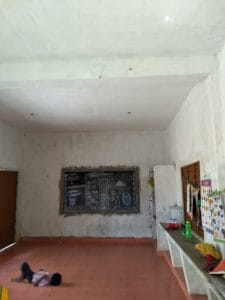42 km on average, a commute of 2 hours, and three buses. This is what a majority of children from the resettlement colonies in Chennai have to navigate to reach their schools. Everyday is a struggle, as they commute in overcrowded buses, where they are often barely able to get a foot on the footboard.
It has been close to two years since 6310 families from 28 settlements alongside Cooum River were relocated to the Tamil Nadu Slum Clearance Board (TNSCB) houses in Gudapakkam (Thiruvallur district), All India Radio (Chennai) Navalur and Perumbakkam in Kancheepuram district. But their lives are yet to see a semblance of order.
Children have been the most affected by the relocation, since a majority of evictions occurred in the middle of the academic year. The slum board houses are far from Anganwadi centres and English medium government schools. While the lack of proximity to the former has been found to cause malnutrition among preschoolers, the distance from schools is snatching away precious hours from productive school-going days.
Just not enough!
A survey conducted by the Information and Resource Center for the Deprived Urban Communities (IRCDUC) points to the dearth of Anganwadi centres and the nominal functioning of facilities. IRCDUC conducted a survey in the three resettlement colonies of Perumbakkam, Navalur and Gudapakkam to evaluate the nutrition and educational facilities provided for children.
“200 children from the relocated settlements were identified through simple random sampling. Information on the centres was collected from anganwadi workers, helpers, mothers and correlated with secondary data available with the Ministry of Women and Child Development, Government of India,” says Vanessa Peter of IRCDUC.
Ayappan, one of the residents of Navalur resettlement colony says that the Anganwadi centres close down as early as 2 pm. “There are no fans, vessels or cylinders in two of the three centres here. Expecting nutritious food in these centres is unrealistic. There are no teachers and staff in the first place,” he says.
There are only 11 centres in these three settlements, catering to a total population of 63,600 — a number that in itself indicates clear violation of norms. “According to the norms, there should be a centre for every 800 people. By that count, there should be 79 centres for these settlements, to address malnutrition and care for young children and pregnant mothers. At least twelve should be constructed at the earliest, on priority,” says Vanessa.
Lack of electricity
The centres in Block 4 and Block 7 of Perumbakkam have been functioning without electricity since their inception in December 2017. “They have not installed the meters yet. When we requested the TNSCB officials to do so, they asked us to contribute. It looks like the welfare schemes are not meant to benefit the poor like us, but to suck out whatever is left,” said Kasthuri C (name changed), a resident.
The advocate commissioner, who visited these sites in May 2017, acknowledged the lapses and asked the TNSCB to ensure improved facilities. Despite that, things have not changed.
The field officer from the TNSCB as well as officials from the ICDS are good at evading questions. The former, despite being in-charge of all amenities in the resettlement colonies, passes the buck and blames the ICDS department, while the latter says that there is a deficiency of funds and that they are doing the best under the circumstances.
A long haul to school
IRCDUC’s report mentions that students from these settlements have to travel anywhere between 17 km and 45 km each day to go to school.
Since the existing high schools in Gudapakkam are full, a few students travel to their old schools in Anna Nagar and Aminjikarai, roughly 25 km from their home. “I didn’t switch to the school here (his present address), as the facilities are bad. I don’t mind the crowded buses, as I am accustomed to my school in Anna Nagar,” shares Giridaran (name changed), a class 10 student from Gudapakkam.
Students from the Navalur settlement travel at least three hours one way to reach their school at Aminjikarai. “We are lucky if we get a direct bus. But, most of the time, we take three buses — from Padappai via Perungalathur and Koyambedu — to reach Aminjikarai,” said Vishnu Kumar, a student.
There is a school that operates from one of the houses in Perumbakkam, without even the most basic of facilities such as a bathroom or playground. About 346 children from the colony have been studying here for more than two years, in cramped conditions hardly conducive to quality education.
What the numbers say
View the complete report here. |
The solution
The Tamil Nadu Slum Clearance Board, the nodal agency for relocating and resettling the residents evicted from the shores of the city’s water bodies, has failed to coordinate with the other departments to ensure basic amenities for these people. Rights groups say that the board has just relocated residents and ignored their requirements. “There has to be an an independent and empowered grievance redressal mechanism to handle issues related to violation of rights of children during eviction and rehabilitation,” says Vanessa Peter.
